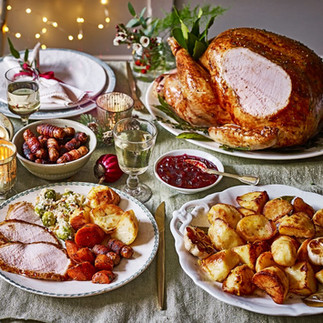5 Tips to Eating Well over the Holidays from a Dietitian
- Jessica Jones

- Dec 23, 2022
- 4 min read
5 tips for eating well over the holidays, from a dietitian’s perspective.
Some answers may surprise you!
If holiday dinners cause a certain amount of stress around food or leave you feeling
guilty afterwards about overindulging and wanting to start a diet in the New Year,
these tips might be helpful to you.
With the holidays quickly approaching, many of us may be getting some last-minute
shopping done, doing some Christmas baking, and enjoying many holiday events
with loved ones. The holidays are a great opportunity to spend time with friends,
family, and even coworkers. And usually where large groups of people are found, an almost equally large amount of food is also found. Food is the center of many
social gatherings, and while this is totally normal, it can leave people feeling stressed out.
This is especially true when the holidays are over, and people are dealing with food
hangovers that leave them feeling like they need to be on a diet in the New Year.
My role as a dietitian is to help you enjoy food and develop the skills to eat
intuitively, based on the needs of your own body. Below I’ve outlined 5 tips to help
you get through the holidays without feeling stress or guilt around food.
1. Eat the foods you enjoy without restriction. Please read that again so it really
sinks in. It’s okay to eat the foods you like, during the holiday season and
throughout the year. Food has many purposes – to provide us with nutrients we
need for health, to be shared with others, and to satisfy our taste, to name a few.
We never want to restrict certain foods as this almost always leads to overeating
later (more on that in tip 3). A general rule of thumb is, when you feel hungry,
satisfy your hunger with food that provides nourishment, and if you’re still feeling
hungry afterwards, have some of the food that satisfies your taste.
2. Pay attention to your hunger and fullness cues throughout the day and
during meals. Our bodies have a great way of letting us know how much food
we need for our own health. Unfortunately, many of us have been conditioned to
ignore our hunger and fullness cues. It’s my job to help you become
reacquainted with these internal cues. If you still feel hungry for another helping,
or if mom’s mashed potatoes were extra good this year, go for it! If you feel
satisfied after the meal but want some more an hour later, that’s okay too. The
important thing is to check in with yourself and give your body what it wants
without feeling overstuffed when the meal is over. If you can learn to master this
skill, it will make a world of a difference to your eating habits in the long run.
3. Eat food throughout the day. Please do not “save all your calories” for the big
dinner at the end of the day – this is a recipe for disaster. When we restrict food
for extended periods of time (>4 hours), this almost always leads to overindulging
in food later, which leads to feelings of guilt for “losing control”, followed by
further restriction. The best way to break this binge and purge cycle is to eat
regularly throughout the day, starting with breakfast. Try to eat breakfast within
an hour of waking and pair a carbohydrate with a protein to balance the meal to
keep you satisfied till your next meal. Some examples could be eggs and toast,
fruit with Greek yogurt, or a smoothie with protein powder.
4. If it helps, go for a light walk after dinner. Please note, I am NOT saying you
need to overexercise after holiday meals to “burn off” the extra food you may
have eaten. The important thing about this tip is how you approach exercise and
physical activity. If you see exercise as a punishment for overeating at a meal or
a way to burn off extra calories, I recommend holding off until you’ve developed a
healthier relationship with food. However, if you view exercise as something you
enjoy and something you do because you truly love your body, feel free to add
this into your routine. If it makes you feel better to get some light movement in
after your holiday meal, feel free to take a loved one with you to get some fresh
air.
5. You do not need to go on a diet or meal plan following the holidays. Diets
and meal plans tend to be restrictive, and frankly, take the fun out of eating. A
few days of eating more than you normally do will not affect your weight in the
long run, I promise. However, if you are concerned or have questions about your
eating habits and would like nutrition support from a dietitian, please reach out to
me. I can help by reviewing your nutrition and health history, collaborating with
you to develop realistic goals, and working with you to create healthy eating
behaviours that will last longer than any diet out there.
I hope these tips were useful and I’d love to know which one was most impactful to you.
If you have any questions or want to book a 1:1 nutrition consultation with me, you can
book online through the Kinetic Massage & Wellness website. Dietitian services are usually covered by most insurance companies, so it’s the perfect time to use up your benefits before the end of the year!











Comentarios